The Essex Boys: How a gangland triple murder became so notorious
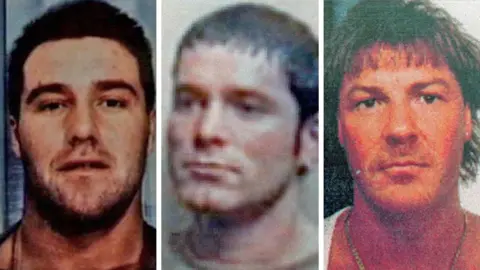 PA archive
PA archiveThe gangland killings of three drug dealers who were found shot in the head in a Range Rover near Chelmsford in 1995 is one of the most notorious and dramatised murders in modern memory. This week, the Parole Board announced the second of the two men responsible would be released from prison, potentially closing the book on this 30-year story. How and why did the so-called Essex Boys murders become such a cult tale?
Ambushed
The bodies of Craig Rolfe, 26, Tony Tucker, 38, and Pat Tate, 37, were discovered on a snowy morning on isolated farmland in Rettendon on 7 December 1995.
Farmer Peter Theobald and his friend Ken Jiggins found the Range Rover parked on a little-known track and suspected the occupants were poachers.
However, the driver and his two passengers were no threat. All three had been ambushed and gunned down with a pump action shotgun.
Such was the extent of their injuries, they were hardly recognisable.
But the men were soon identified by journalists as being three of the most prominent drug dealers in Essex.
Mr Tucker was also known for providing security for nightclubs across Essex and had been a security guard for former super middleweight boxing champion Nigel Benn.
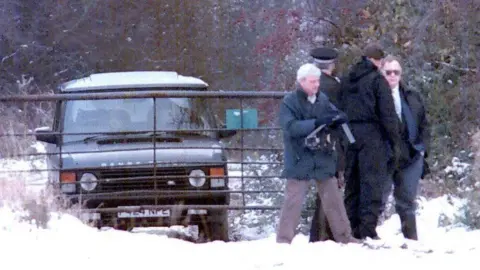 Sky Documentaries
Sky Documentaries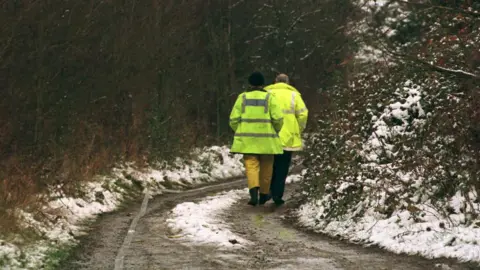 PA Media
PA MediaFollowing the discovery, a major police investigation codenamed Operation Century was launched.
It produced no arrests or evidence leading to a prosecution.
But lines were quickly drawn between their deaths and the 1990s rave scene - connections that provided inspiration for the countless films, documentaries and TV dramas that followed in the years ahead.
During the investigation it was suggested the murders may have been a revenge attack in light of the drugs death of Leah Betts in Basildon a few weeks earlier.
It was believed Mr Tucker ultimately supplied the ecstasy tablet that killed the 18-year-old as she celebrated her birthday in Raquels nightclub.
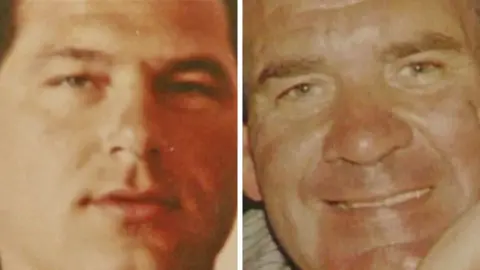
The key witness in convicting the suspects - Jack Whomes and Michael Steele - was police informer and so-called supergrass Darren Nicholls, from Braintree, who gave evidence against his former friends at their trial.
Both Whomes and Steele were subsequently given life sentences at the Old Bailey in January 1998.
Essex Boys timeline
- 7 Dec 1995: Anthony Tucker, Pat Tate and Craig Rolfe found shot dead in a Range Rover in Rettendon, Essex
- May 1996: Darren Nicholls arrested in possession of drugs. He turns into a so-called supergrass and gives evidence against Michael Steele and Jack Whomes
- Jan 1998: Steele and Whomes jailed for life at the Old Bailey
- October 2001: Case referred to the Criminal Cases Review Commission for the first time
- 22 February 2006: Court of Appeal rejects appeal against convictions. Further appeals are rejected in 2013 and 2016
- 24 May 2018: Whomes has life sentence reduced
- January 2021: Parole Board approves Whomes for release from prison
- February 2025: Parole Board approves Steele's release
After their imprisonment, the case was first referred to the Criminal Cases Review Commission over concerns that Mr Nicholls was an unreliable witness.
Mr Nicholls maintained Steele was behind a series of drug smuggling runs in 1995, one of which led to a row with the three victims over poor quality cannabis.
He was later entered into the witness protection scheme.
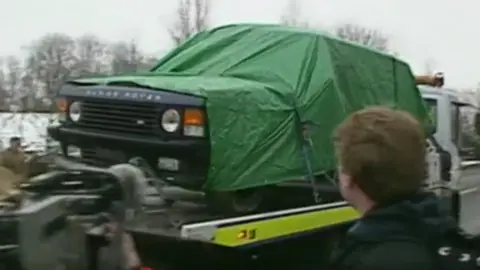
The murderers' appeal was referred to the Court of Appeal and rejected. Further appeals were dismissed in 2013 and 2016.
However, Whomes, of Brockford, Suffolk, had his sentence cut in 2018 and was released from prison three years later.
Steele, now aged 82, of Great Bentley, Essex, was given a minimum term of 23 years, which expired in 2019, but the Parole Board had been worried about his risk of reoffending.
He appeared before parole panels in May 2023, in May, November and December last year, and also this January.
In its report published on Thursday, the parole Board said he offended for "financial gain and out of greed" and there was "an element of thrill-seeking in his actions".
But the panel concluded Steele's imprisonment was "no longer necessary for the protection of the public" and approved his release.
The triple murders on film
The murders gained international attention and prompted several books, TV series and films.
The killings were immortalised in the 2000 film Essex Boys, which starred Sean Bean and coined the name.
Also inspired by the murders was the crime and gangster film franchise Rise of the Footsoldier, which has had six installations since 2007.
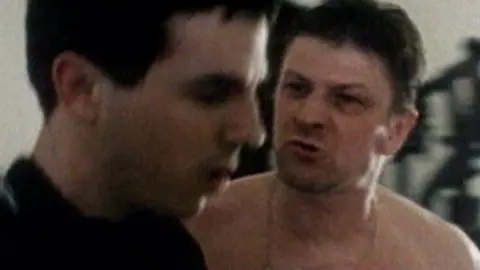 Granada Films
Granada FilmsA Sky Documentaries series in 2023 interviewed detectives involved with the 1995 case who were critical of the police investigation.
Former Met Police detective David McKelvey claimed "credible lines of investigation were not followed" and that the assassination was related to an armed robbery, not drug dealing.
Essex Police previously said the case was "exhaustively examined" and there was no fresh evidence to dispute the original verdicts.
Follow Essex news on BBC Sounds, Facebook, Instagram and X.
